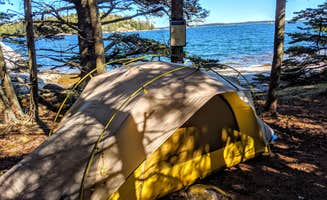The Deer Isle Archipelago offers primitive dispersed camping opportunities near Dixmont, Maine. Located approximately 60 miles southeast of Dixmont in Penobscot Bay, these island sites require specific water navigation skills and proper preparation. The archipelago experiences typical coastal Maine weather with summer temperatures averaging 70-80°F during days and 50-60°F overnight, with frequent fog conditions possible.
What to do
Wildlife observation opportunities: The islands provide excellent opportunities for birdwatching and marine wildlife spotting. Visitors may see various seabird species, harbor seals, and occasionally porpoises in the surrounding waters.
Day trips to Isle au Haut: Wheat Island serves as an ideal base camp for exploring nearby Isle au Haut. "Perfect island for exploring the close-by Isle au Haut, a remote section of Acadia National Park, but very hard to get reservations at Duck Harbor Campground," notes camper Shari G.
Kayaking and island exploration: The Deer Isle Archipelago contains numerous islands within paddling distance. Buckle Island offers an accessible starting point with its sandy shore. According to reviewer Shari G., "One of the MITA camping areas in the Deer Isle Archipelago, this island has 2 sites – one larger area up in the woods, the other quite small near the granite shore."
What campers like
Sunset and moonrise views: The islands offer unobstructed views of astronomical events. One camper reports from Wheat Island: "We stayed at the larger site and had a gorgeous view of the sun setting and full moon rising."
Beginner-friendly sea kayaking: The eastern shore of Buckle Island features an accessible landing area that makes it suitable for those new to kayak camping. As one visitor explains, "The sandy shore, which is exposed for a good portion of the day, is easy to land on and a short walk to a trail into the woods."
Free camping with membership: All dispersed sites in the area are available at no cost for Maine Island Trail Association (MITA) members. Sites operate on a first-come, first-served basis with no reservation system, providing flexible free camping near Dixmont, Maine for those willing to travel to the coast.
What you should know
No fresh water sources: All island camping areas require bringing sufficient drinking water. As one Wheat Island visitor cautions: "Come prepared with fresh water (there is no fresh water for filtering) and wag bags (no toilets)."
Insect preparation essential: Mosquitoes remain active throughout the summer season and into early fall. "Be prepared for mosquitoes. We thought we were passed mosquito season in early September, but alas, they were pretty bad at sunset," reports one Wheat Island camper.
Tidal landing considerations: Water access points vary significantly with tides, affecting landing difficulty. Plan arrivals according to tide schedules. A visitor notes that Wheat Island "can be a tricky island to land on at high tide, so plan accordingly."
Tips for camping with families
Select appropriate sites: Some camping areas accommodate larger groups better than others. Wheat Island offers "one very small one on the northeast side, the other perfect for larger groups on the southwest side."
Practice water safety: All islands require boat access, so families should ensure proper personal flotation devices for all members and establish clear water safety protocols before departure.
Plan for no facilities: Explain to children beforehand that these primitive camping areas have no toilets, running water, or other amenities. Bring appropriate sanitation supplies such as wag bags for human waste management.
Tips from RVers
No vehicle access possible: None of the dispersed camping options near Dixmont provide RV accommodations as they are boat-access only. RV travelers seeking free camping near Dixmont must look to mainland options.
Base camp strategy: Some RV travelers use mainland campgrounds as base camps, then take day trips via rented kayaks to explore the islands without overnight stays.
Equipment transport limitations: Those accustomed to RV camping should dramatically scale down gear when transitioning to island camping, focusing on essential items that can be transported by boat.



